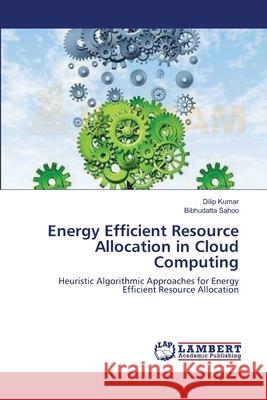Energy Efficient Resource Allocation in Cloud Computing » książka
Energy Efficient Resource Allocation in Cloud Computing
ISBN-13: 9783659563041 / Angielski / Miękka / 2014 / 92 str.
These heuristic algorithms operate in two phases, selection of task from the task pool, followed by selection of cloud resource. A set of ten greedy heuristics for resource allocation using the greedy paradigm has been used, that operates in two stages. At each stage a particular input is selected through a selection procedure. Then a decision is made regarding the selected input, whether to include it into the partially constructed optimal solution. The selection procedure can be realized using a 2-phase heuristic. In particular, we have used 'FcfsRand', 'FcfsRr', 'FcfsMin', 'FcfsMax', 'MinMin', 'MedianMin', 'MaxMin', 'MinMax', 'MedianMax', and 'MaxMax'. The simulation results indicate in the favor of MaxMax. The novel genetic algorithm framework has been proposed for task scheduling to minimize the energy consumption in cloud computing infrastructure. The performance of the proposed GA resource allocation strategy has been compared with Random and Round Robin scheduling.
These heuristic algorithms operate in two phases, selection of task from the task pool, followed by selection of cloud resource. A set of ten greedy heuristics for resource allocation using the greedy paradigm has been used, that operates in two stages. At each stage a particular input is selected through a selection procedure. Then a decision is made regarding the selected input, whether to include it into the partially constructed optimal solution. The selection procedure can be realized using a 2-phase heuristic. In particular, we have used FcfsRand, FcfsRr,FcfsMin,FcfsMax, MinMin, MedianMin, MaxMin, MinMax, MedianMax, and MaxMax. The simulation results indicate in the favor of MaxMax. The novel genetic algorithm framework has been proposed for task scheduling to minimize the energy consumption in cloud computing infrastructure. The performance of the proposed GA resource allocation strategy has been compared with Random and Round Robin scheduling.











